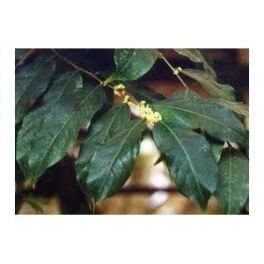CASEARIA SYLVESTRIS
Guacatonga - Cha de Bugre
30g
Family: Flacourtiaceae
Genus: Casearia
Species: sylvestris
Synonyms: Samyda parviflora, Casearia parviflora, Anavinga samyda
Common Names: guacatonga, guassatonga, wild coffee, burro-kaa, café-bravo, cafeiillo, café silvestre, congonhas-de-bugre, corta-lengua, crack-open, dondequiera, erva-de-bugre, erva de pontada, guayabillo, mahajo, papelite, pau de lagarto, piraquina, raton, sarnilla, ucho caspi
Parts Used: Bark, Leaves
Casearia sylvestris herb treatment
Casearia sylvestris is a plant used in the treatment of several diseases, including cancer. Studies have shown that C. sylvestris presents an interesting antitumoral potential, due to the presence of casearins and some sesquiterpens with antitumoral activity. Casearia sylvestris is popularly known in Brazil as guaçatonga.
The Casearia sylvestris is used in folk medicine in Brazil and all Latin American to treat inflammation, cancer, microbial infection and snake bites. Studies showed that the aqueous extract can inhibit many toxic effects caused by snake venoms (or caused by phospholipase A(2) isolated) from different species, mainly of Bothrops genus. Inhibition of enzymatic and myotoxic activities, decrease of edema formation and increase of the survival rate of rats injected with lethal doses of bothropic venoms are some toxic effects inhibited by Casearia sylvestris.
| |
Properties/Actions Documented by Research:
analgesic (pain-reliever), antacid, anti-inflammatory, antibacterial, anticancerous, antifungal, antitumorous, antiulcerous, antivenin, gastroprotective (protects the gastric tract)
Other Properties/Actions Documented by Traditional Use:
anesthetic, antihemorrhagic (reduces bleeding), antimutagenic (cellular protector), antiseptic, antiviral, astringent, blood cleanser, detoxifier, digestive stimulant, wound healer
Cautions: none
|
Traditional Preparation: Twenty grams of dried leaves are infused in a liter of water and quarter-cup amounts are taken 2-3 times daily with meals as a digestive and anti-ulcer aid. Since most of the chemicals are water soluble, powdered leaves in tablets or capsules (1-2 grams twice daily) can be substituted if desired. The above infusion can also be used topically for wounds, burns, skin rashes, and as a mouth wash after dental work or tooth extractions.
Contraindications: None known.
Drug Interactions: None reported.
30g
Package with 30g
 Maximize
Maximize







































